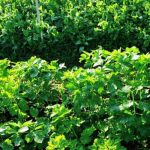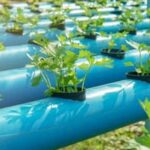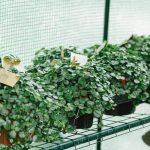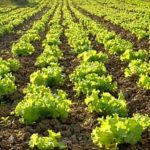Are you interested in growing your own organic vegetables but don’t have a large backyard or garden space? Organic container vegetable gardening may be the perfect solution for you. This method allows you to cultivate a variety of vegetables using organic practices in containers, making it accessible to urban dwellers, apartment residents, and anyone with limited outdoor space. By utilizing this approach, you can enjoy the benefits of fresh, homegrown produce while minimizing environmental impact and promoting sustainable living.
Container gardening involves planting and growing vegetables in pots, planters, or other types of containers rather than directly in the ground. This method offers several advantages, including better control over soil quality and drainage, as well as the ability to move the containers to optimal sunlight and protection from harsh weather conditions.
When opting for organic container vegetable gardening, you are choosing to cultivate your crops without synthetic pesticides or fertilizers. This environmentally-friendly approach promotes soil health and biodiversity while providing you with nutritious, chemical-free produce right at your fingertips.
In this comprehensive guide to organic container vegetable gardening, we will explore various aspects of this popular practice. We’ll discuss how to choose the right containers for your organic garden, select suitable vegetables for container growth based on space and climate considerations, as well as provide tips for soil and fertilizer selection, watering techniques, pest and disease management, maintaining organic practices, and harvesting your bountiful container garden.
Whether you’re a novice gardener looking to embark on a new hobby or an experienced enthusiast seeking to expand your knowledge of sustainable gardening methods, this article has everything you need to get started on your organic container vegetable gardening journey.
Choosing the Right Containers for Organic Gardening
When it comes to organic container vegetable gardening, choosing the right containers is essential for the success of your garden. The first step is to select a container that allows for proper drainage, as this is crucial for preventing waterlogged soil which can lead to root rot.
Consider containers made from materials such as clay, wood, or fabric pots, as they tend to provide better drainage compared to plastic containers. Additionally, these materials are more environmentally friendly and can be easily sourced from sustainable sources.
Size is another important factor to consider when choosing containers for organic vegetable gardening. Larger containers generally retain moisture better and provide more space for roots to grow, while smaller containers are suitable for compact vegetables such as lettuce and herbs.
Keep in mind that the size of your container will also determine the number of vegetables you can grow in it. For example, a large container may be able to accommodate multiple plants or different varieties of vegetables while a small container would only support one or two plants.
In addition to drainage and size, it’s important to consider the aesthetics of your containers. Since organic container vegetable gardening can be done in small spaces such as balconies or patios, using visually appealing containers can enhance the overall look of your garden and create a more enjoyable gardening experience. Many gardeners also opt for repurposed containers such as buckets, crates, or even old metal tins as part of their sustainable approach to organic gardening.
| Container Material | Advantages |
|---|---|
| Clay | Provides good drainage and insulation; durable |
| Wood | Natural look; retains moisture well; biodegradable |
| Fabric Pots | Excellent drainage; lightweight and easy to move; promotes air pruning of roots |
Selecting the Best Vegetables for Container Gardening
When it comes to organic container vegetable gardening, choosing the right vegetables is key to a successful harvest. Not all vegetables are well-suited for container gardening, so it’s important to select those that thrive in limited space and can adapt to the confines of a pot or planter. Here are some popular choices for container vegetable gardening:
- Tomatoes: Compact varieties such as cherry or patio tomatoes are ideal for containers.
- Peppers: Both sweet and hot pepper plants do well in pots and require minimal space.
- Herbs: Basil, rosemary, thyme, and other herbs are perfect for small containers and can be easily grown on a sunny windowsill.
- Salad Greens: Lettuce, spinach, and arugula can be grown in shallow containers and provide a continuous harvest throughout the growing season.
- Cucumbers: Dwarf cucumber varieties are well-suited for vertical growing in containers with support.
When selecting vegetables for your organic container garden, consider the available space and climatic conditions in your area. Some compact varieties may be better suited for smaller containers, while larger pots can accommodate more sprawling plants. Additionally, take into account the amount of sunlight your container garden will receive, as this will impact the growth and productivity of your chosen vegetables.
Tips for Choosing the Right Vegetables Based on Space and Climate
- Research the mature size of each vegetable plant to ensure it will fit within your chosen containers.
- Consider the temperature and sunlight requirements of each vegetable when making your selection.
- Take note of any specific care instructions or growing tips for each type of vegetable you plan to grow in containers.
By carefully selecting the best vegetables for your organic container garden based on space and climate considerations, you can set yourself up for a bountiful harvest of fresh, homegrown produce.
Soil and Fertilizer for Organic Container Gardening
Recommendations for Organic Soil Mixes
When it comes to organic container vegetable gardening, choosing the right soil mix is crucial for the success of your plants. Look for high-quality organic potting mixes that are specifically formulated for vegetable container gardening. These mixes should provide good drainage, aeration, and essential nutrients for your vegetables to thrive. Consider adding some compost to the soil mix to further enrich it with natural nutrients and beneficial microorganisms.
Best Natural Fertilizers for Container Vegetables
Organic container vegetable gardening relies on natural fertilizers to nourish the plants without the use of synthetic chemicals. Some excellent options include compost tea, fish emulsion, seaweed extract, and bone meal. These natural fertilizers provide a balanced array of nutrients that promote healthy growth and strong root development in your container vegetables. Additionally, they contribute to improving the overall soil structure and fertility over time.
Tips for Soil Maintenance
To ensure ongoing fertility in your containers, consider top-dressing the soil with compost or worm castings every few months to replenish nutrients and beneficial microorganisms. It’s also essential to monitor the pH levels of the soil to maintain an optimal environment for your vegetables. Investing in a good quality pH meter can help you adjust the acidity or alkalinity of the soil as needed to support healthy plant growth.
Watering and Drainage Techniques for Organic Container Gardening
When it comes to organic container vegetable gardening, proper watering and drainage techniques are key to the success of your plants. Here are some important tips for maintaining optimal moisture levels in your container garden:
- Use containers with drainage holes: Ensure that your containers have adequate drainage to prevent waterlogged soil, which can lead to root rot and other issues.
- Watering frequency: Depending on the climate and the type of vegetables you’re growing, the frequency of watering will vary. Generally, it’s best to water when the top inch of soil feels dry to the touch.
- Avoid overwatering: Overwatering can be just as harmful as underwatering. Make sure not to drown your plants by allowing excess water to escape through drainage holes.
Maintaining proper moisture levels is crucial for the health and productivity of your container garden. In addition to watering techniques, it’s important to consider the type of soil you use and how it retains moisture. Here are some additional tips for successful watering and drainage in organic container gardening:
- Choose a high-quality organic potting mix: A well-draining soil mix specifically formulated for container gardening will provide the right balance of moisture retention and aeration for your vegetables.
- Consider using mulch: Applying a layer of organic mulch, such as straw or shredded leaves, can help regulate soil temperature and retain moisture, reducing the need for frequent watering.
- Monitor moisture levels regularly: Keep an eye on how quickly the soil in your containers dries out, especially during hot or windy weather. Adjust your watering schedule accordingly to ensure consistent moisture for your plants.
By incorporating these watering and drainage techniques into your organic container vegetable gardening routine, you can help maintain healthy, thriving plants without relying on synthetic chemicals or additives. This approach not only benefits the environment but also ensures that you’ll enjoy a bountiful harvest of homegrown produce from your organic containers.
Pest and Disease Management in Organic Container Gardening
Preventing Pest Infestations
One of the key benefits of organic container vegetable gardening is the ability to prevent and manage pests without resorting to chemical pesticides. To prevent pest infestations in your container garden, consider companion planting, which involves growing certain plants together to deter insects or attract beneficial insects that prey on pests.
For example, planting marigolds alongside your vegetables can help repel nematodes, aphids, and other common garden pests. Additionally, incorporating natural barriers such as diatomaceous earth or copper tape around your containers can also help keep pests at bay.
Natural Solutions for Disease Control
Organic container vegetable gardening also offers natural solutions for managing and preventing diseases that may affect your plants. One effective method is practicing crop rotation by changing the location of your vegetables each season to reduce the risk of soil-borne diseases.
Another strategy is using compost tea, a natural fertilizer rich in beneficial microorganisms that can help suppress harmful pathogens. Additionally, applying neem oil or garlic spray can offer protection against common fungal diseases without harming the environment or beneficial insects.
Beneficial Insects and Biological Controls
In an organic container garden, it’s important to encourage the presence of beneficial insects that can naturally control pest populations. Ladybugs, lacewings, and parasitic wasps are just a few examples of beneficial insects that prey on harmful pests like aphids and caterpillars.
To attract these helpful allies to your garden, consider planting flowers such as dill, fennel, or yarrow that serve as nectar sources for beneficial insects. Furthermore, introducing biological controls such as predatory nematodes or microbial insecticides can offer targeted protection against specific pests while preserving the overall ecosystem of your container garden.
Maintaining Organic Practices in Container Gardening
When engaging in organic container vegetable gardening, it is important to maintain organic practices to ensure the health and productivity of your plants. One key strategy for maintaining organic practices is to avoid the use of synthetic fertilizers, pesticides, and herbicides. Instead, opt for natural solutions such as homemade compost, compost tea, and biological pest controls.
Another important aspect of maintaining organic practices in container gardening is promoting biodiversity within your garden. This can be achieved by interplanting a variety of vegetables, herbs, and flowers in your containers. Biodiversity not only helps to naturally deter pests and diseases but also encourages a healthy ecosystem within your container garden.
Additionally, proper care and maintenance of the soil is crucial for organic container gardening. Regularly amending the soil with organic matter such as compost or aged manure helps to replenish nutrients and improve soil structure. Avoid using chemical-based soil treatments or non-organic fertilizers that can disrupt the natural balance of your container garden.
| Organic Gardening Practice | Benefit |
|---|---|
| Avoiding synthetic fertilizers & pesticides | Promotes environmental sustainability and reduces chemical exposure |
| Promoting biodiversity | Naturally deters pests and diseases while creating a healthy ecosystem |
| Caring for the soil with organic matter | Replenishes nutrients and improves soil structure without disrupting natural balance |
Harvesting and Enjoying the Fruits of Your Organic Container Garden
In conclusion, organic container vegetable gardening offers a convenient and sustainable way to grow your own produce at home. By utilizing the right containers, soil mixes, natural fertilizers, and pest management techniques, you can enjoy a bountiful harvest of fresh, healthy vegetables right from your own patio or balcony. Choosing organic methods for vegetable gardening not only benefits your health but also promotes environmental sustainability by reducing the use of synthetic chemicals.
After carefully selecting the best containers and vegetables for your organic garden, it’s important to maintain proper watering and drainage techniques to ensure optimal moisture levels for healthy plant growth. Additionally, implementing organic pest and disease management practices will help protect your container garden without the need for harmful chemicals. By promoting biodiversity in your container garden, you can further enhance its sustainability and resilience against potential issues.
Once it’s time to harvest the fruits of your labor, you can look forward to enjoying a variety of homegrown organic produce. From fresh salads to savory stir-fries, there are countless creative ways to utilize the vegetables from your container garden in delicious meals.
Whether you’re a seasoned gardener or new to the world of organic container vegetable gardening, this rewarding experience is sure to provide you with an abundance of flavorful and nutritious produce for you and your family to enjoy.
Frequently Asked Questions
What Are the Safest Containers for Growing Vegetables?
The safest containers for growing vegetables are those made of food-safe materials such as untreated wood, ceramic, or BPA-free plastic. These containers are less likely to leach harmful chemicals into the soil that can be absorbed by the vegetables.
What Vegetables Work Well in Container Gardens?
Many vegetables work well in container gardens, including tomatoes, peppers, lettuce, spinach, kale, radishes, carrots, and herbs like basil and oregano. Compact and dwarf varieties of vegetables are best suited for container gardening due to space limitations.
What Is the Best Material for Growing Vegetables in Pots?
The best material for growing vegetables in pots is typically a combination of good drainage and insulation. Therefore, containers made of terracotta or clay are often favored as they allow excess water to evaporate and provide insulation against temperature fluctuations. Additionally, fabric pots also offer good drainage and air flow for healthy vegetable growth.

If you’re looking to get into vegetable gardening, or are just looking for some tips on how to make your current garden better, then you’ve come to the right place! My name is Ethel and I have been gardening for years. In this blog, I’m going to share with you some of my best tips on how to create a successful vegetable garden.





